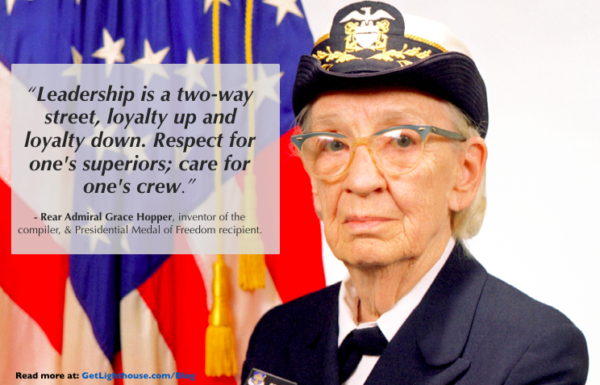Are you working on your leadership skills? What is your biggest barrier to improving as a manager?
Do you lack the confidence to talk to your team? Are you struggling to find time for your growth and development? Or maybe you're just unsure of where to start and what to improve?
For most leaders, it's a combination of all of those issues, plus a variety of other challenges.
An article by HBR shared that, despite American companies spending lavishly on training, their leaders often revert to old habits. The article cites a study by CEB in which an overwhelming 75% of managers were dissatisfied with their companies' learning and development function.
Unfortunately, with everything going on as a busy manager, improving as a leader never seems to be at the top of our priority lists for long. We always have something more important to do, or simply can't find time for ourselves consistently enough.
The problem with this outlook is, if you fail to grow your leadership skills, it will eventually catch up with you. Things will fall apart with your team.
If you're not making an effort to nurture your own skills, you risk your team becoming unmotivated and disengaged. As long as you're doing the same things over and over, you're unlikely to be getting the best out of anyone. As Duke basketball coach Mike Krzyzewski put it: "Leadership is an ever-evolving position.”
Today, we help you think through the most important leadership skills you need to build to be a successful manager with a great team.

Why Your Leadership Skills aren't improving, and what to do about it
Most managers are aware of the need to work on their skills. However, actually taking that first step is always the hardest thing to do.
The most logical question you can ask yourself is: "Where do I even start?” or "What are the highest impact things I should focus on?"
To help you answer these questions, we break down the key areas leaders like you can focus on to level up. We also highlight the most common challenges related to them and show you proven methods of overcoming them.
Table of Contents:
- Wasted 1 on 1s
- Failing to grow and develop your team members
- Not getting to know your team
- Poorly written reviews
1) Wasted 1 on 1s
Do you ever get that uneasy feeling your check-ins aren't really valuable?
If that's the case you and your team members probably feel like you are just going through the motions. Then, after your meeting, both you and them feel relieved that the conversation is over and you quickly forget about it.
We've written several articles about the value of 1 on 1s for you and your team. In fact, they can lead to improvement across a variety of common issues:
- Poor communication
- Lack of feedback & coaching
- Career growth and development stalling
- Unclear purpose of their work
- Lack of trust and confidence in their manager
- Bottled up frustrations
- Interpersonal and inter-team conflicts
Given how many key problems 1 on 1s can solve, preparing for them is essential. Despite this, many managers keep reducing them to simple status updates. This blocks out any time for the true benefits of 1 on 1s.

How to improve your 1 on 1s
The most important thing you can do to have great 1 on 1s is prepare. Despite this sounding obvious, many managers start their check-ins without a clear idea of what they want to cover.
Keeping notes before, during, and after every 1 on 1 will help you know what to say and keep the meeting on track to be valuable for both of you.
Of course, as your team grows, this becomes more of a challenge; you may start having docs for each person, or maybe even multiple docs per person so you have some private notes and some shared ones.
That's why you may want a system that stores them all in one place. This way, preparing won't require you to spend time digging through a bunch of docs and files or trying to find the right one for the right person on your team.
But having quality 1 on 1s is much more than just being well organized. Thinking of things to say to get people talking is equally important.
However, we're not all social butterflies, which is why experienced managers know how to break the ice and draw out answers from team members.
In case you're unsure of what to ask team members in 1 on 1s, we've prepared over 132 essential questions to get you going. You can use them to build rapport, find out more about your team, build deeper relationships, get their feedback and ideas, and much more.
Quality 1 on 1s can make such a huge difference for your entire company. As Intel founder Andy Grove puts it:
Action from 1 on 1s >> simply talking in 1 on 1s
Finally, make sure you're applying what you've learned to your check-ins. If you don't take action in your 1 on 1s, you set yourself up to never actually fix any of the problems nor take advantage of the good ideas that come out your meetings.
That's why you should be really explicit in your 1 on 1s; specifically talk about what both of you will do by next meeting so you build momentum together. Then, you may be surprised how much easier it becomes to follow a simple pattern of your 1 on 1s going well every time:
- Bring up a key issue or ask for their ideas in your 1 on 1
- Talk through it and really hear them out
- Set expectations and agree to work together on what you just talked about
Do this a few weeks in a row, and you may be surprised how much your team member, and your relationship with them improves.
Of course, all of this requires effort by you, which is why it may be a good idea to get some help. That's why we built Lighthouse to help you.
Lighthouse gives you suggestions on what to ask your team, helps you manage the prep and follow up in the meetings, and reminds you before next time so you can pick up where you left off. It's the best way to organize everything you need as a manager in one place and stay prepared. You can start a free, 21-day trial here.
Further Reading:
Want to learn more about having great 1 on 1s with your team? Then check out these helpful posts:
- Share with your team what they should expect with: 7 Essential Tips for Effective 1 on 1 Meetings with Your Manager
- Convince yourself or a colleague to start 1 on 1s with this post: 25 Reasons You Must Start Having One on Ones with Employees
- Then learn how to get started here: How to start 1 on 1s with your team
- Tune up all of your skills then with our mega post: The 1 on 1 meeting template great managers use
2) Failing to grow and develop your team members
Did you know that a lack of career growth is one of the biggest causes of turnover?
Studies from PwC and Deloitte, as well as the Mary Meeker internet trend report have shown opportunities for career development are an extremely important motivator for Millennials.
And they're not alone. In a 2018 Gartner study, a lack of future career development was a concern for 40% of departing employees, across all generations.
Does every member of your team have a clear career development plan?
Unfortunately, many managers don't pay attention to growing their people.
They think that if someone is happy with their current role, they'll stay that way forever. Not surprisingly, as people stay longer at your company they need new challenges...or they'll look for them elsewhere.

How to plan out your team's growth
Okay, we now know that a lack of growth will cause people to leave your company in waves. So, what can you do about it?
One of the most powerful conversations you can have with your team is about their long term goals. Even if their ambitions don't align with their current position, supporting them is powerful.
Lay out a plan together to show how everyone on your team can make progress. Help them understand exactly when and how they can earn a promotion, or deepen their skills in their current role. Doing this show you care about their long term success, and want to give them a reason to stay long term.
Remember: the point of helping your team grow is not just about people's careers. It's about showing them you care about their development and building long-term trust that you have their best interests in mind.
The best way to do that is through your 1 on 1s. Work team goals into those meetings every 3-6 weeks and check on their progress over time. Then, you can adjust their next steps and their goals as things change and they grow.
Further Reading:
Looking for more guidance on talking about the growth of your team? Start here:
- Learn about The 3 Questions Every Manager Struggles with Making Career Development Plans
- Find out about Employee Development: How to grow your employees when you can't promote them
- Uncover The Competitive Edge to Winning the World Series and Helping Your Team Thrive
- For when you don't have as much time to help them: How Employees Can Drive Their Own Career Growth
- And for those that aren't sure yet: How to help when your team member can't answer "What are your career goals?”
3) Not getting to know your team
An online survey by Harris Poll found that 69% of managers say they're uncomfortable communicating with their employees.
Are you one of those kinds of managers?
There are two huge reasons behind this kind of discomfort: a lack of rapport and psychological safety.
Even though rapport is the foundation of any great relationship, it's often overlooked in the workplace. Building rapport requires soft skills, and soft skills are rarely taught. A report by Gallup shows just how important it is for managers to have engaged teams:
Without rapport, communication and collaboration become so much harder than they have to be. And all it takes is investing a little time in getting to know what makes each person on your team uniquely them.
Psychological safety = more creative teams.
Psychological safety is an irreplaceable ingredient of a healthy team culture. Wikipedia defines psychological safety as the ability to, "show and employ one's self without fear of negative consequences of self-image, status or career.”
Studies have shown that this attitude is essential for overcoming new, uncertain, and complex problems. People cannot be creative and share bold ideas unless they have this comfort.
According to Gallup, psychological safety has a variety of benefits including: "27% reduction in turnover, a 40% reduction in safety incidents, and a 12% increase in productivity.”
Also, according to a 2020 government funded study, psychological safety positively impacted creativity, work performance, and team learning. Additionally, a 2017 Gallup survey found that safe environments can reduce turnover rates by almost 30%.
Those all sound pretty good, right?
It makes sense, doesn't it? If you like and trust your coworkers and managers, you're more likely to share your ideas, and want to collaborate. While if you don't feel trust and rapport with your colleagues, you may be afraid, or not feel like it's worth it to share.
As a manager, you can help create and foster that environment.

How to get to know your team better
You really can find ways to build trust, loyalty, and understanding with anyone. If you're unsure of how to break the ice, ask about things like their hobbies, passions, family, ambitions, and others to spark interesting discussions.
We've broken down a range of topics you can use as conversation starters in more detail here.
Additionally, make sure to remember key names, birthdays, work anniversaries, and your people's interests. By learning all this information over time, you can easily become a more approachable, caring manager.
You will be amazed how far it can go when you remember their birthday, or ask how their kids are doing. The little things really matter.
And by setting this example of caring about each person on your team uniquely, you'll be building a culture based on strong rapport and psychological safety.
Further Reading:
Need more help understanding rapport and psychological safety? These posts can help you:
- Learn 82 ways to build rapport with literally anyone here.
- See why leaders from the military to software to the government across many generations all agree on the importance of rapport.
- Learn all about the origins and benefits of psychological safety here.
- Want to know the secret of a 9-time NBA championship-winning coach? Hint: He got to know all his players to uniquely motivate them.
4) Poorly written reviews
Are you relying on memory to evaluate people's work over an extended period of time? If you are, you are much more prone to what's known as recency bias.
Simply put, recency bias means your judgment will be based on recent events or activities that can be readily recalled only.
This can lead to you either overestimating or underestimating your team members' performance based on the last month or so of their work.
What's even worse, you miss out on most of the year's work that you either want to positively reinforce, or coach them up to improve.
Performance evaluations have somewhat of a bad rep exactly because of this problem. But it's far from the only issue causing review-related stress. Reviews are almost universally hated because they are:
- Time-consuming: It takes a lot of time for managers to write out their reviews, especially if they don't have good notes from throughout the year to reference.
- Surprising, and not in a good way: Imagine hearing feedback that directly impacts your compensation and promotion prospects for the next year only at review time. How would you feel? By that point, it's already too late to change things, and this can leave your team feeling deflated.
- Overwhelming: Hearing more than a dozen areas for improvement all at once can be difficult to process, and even harder to change.
There has to be a better way, right?

How to make performance reviews more meaningful
Even though they have their drawbacks, performance reviews can be very useful. They were created with good intentions, and skilled managers can use them as powerful motivators with the help of the right tools.
The most important thing to remember about performance reviews is that they're not a one-off thing. They're supposed to be based on long-term impressions, not something that happened only recently. For that to happen, you can't rely on memory or vague clues.
Having regular conversations with your team about performance is the best way to avoid surprises and improve your reviews.
With quality 1 on 1s complementing your yearly evaluations, you'll know exactly what worked and what didn't over a longer period of time. You'll also have a place to regularly check in on both things you talked about last review, and work on new issues before they go into the next review.
Keep in mind, however, that this process is never going to be perfect. Don't be afraid to iterate, change, and adapt your methods based on the results.
Keep track of the insights you gain during your 1 on 1s and make sure to work on providing quality feedback regularly. This way, performance reviews will become something everyone in your company actually looks forward to, and is never surprised by what is in them.
Further Reading:
Feeling like your performance review process could be better? Learn how to tune them and what happens before and after below:
- Learn The Case for Keeping Employee Performance Reviews
- Find out How to Make Your Performance Reviews Awesome
- When you need to coach your team, how you approach it (in or out of a review) makes all the difference, so learn How to Give Constructive Feedback to Motivate and Improve Your Team
- There is such a thing as too much of a "good" thing: Why Real Time Feedback is a Terrible Idea for Your Company
- When it's time to give feedback, mix it up sometimes by using some of these 5 Awesome Ways to Give Feedback to Your Team

Conclusion
Being an effective leader requires consistency and getting the fundamentals right. However, keeping track of everything you need to do can quickly become overwhelming and disorganized, especially as your team grows. This can cause any positive progress you may have made to lose momentum.
Want to build up your management skills? Lighthouse Lessons can help you.
Our bite size, highly actionable programs are perfect for even the busiest of managers. Become a better leader like Jonathan Silva did by learning more and signing up here.





